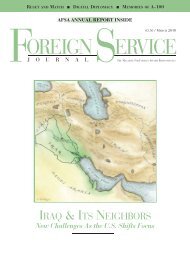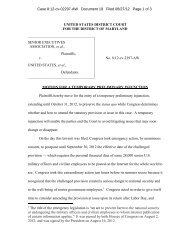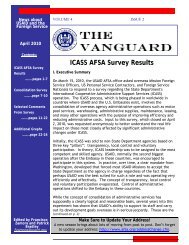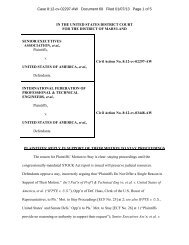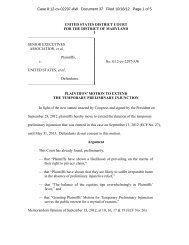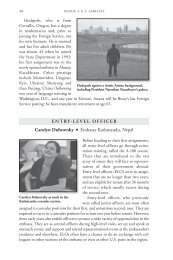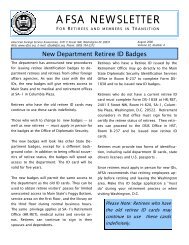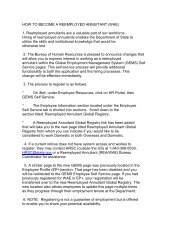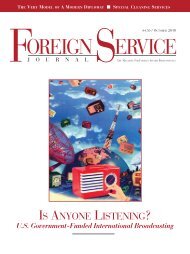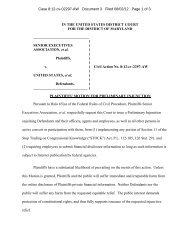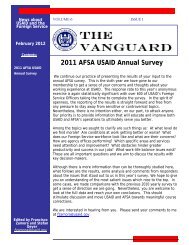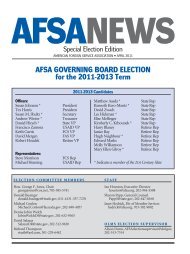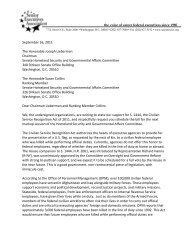F OCUS - American Foreign Service Association
F OCUS - American Foreign Service Association
F OCUS - American Foreign Service Association
Create successful ePaper yourself
Turn your PDF publications into a flip-book with our unique Google optimized e-Paper software.
AFSA Issue Brief<br />
<strong>Foreign</strong> <strong>Service</strong> Resource Needs:<br />
Talking Points<br />
Since the 2003 invasion of Iraq,<br />
staffing demands on the <strong>Foreign</strong><br />
<strong>Service</strong> have soared: 300 positions in<br />
Iraq, 150 positions in Afghanistan, 40 positions<br />
in the State Department’s office to<br />
coordinate reconstruction efforts, 100-plus<br />
training positions to increase the number<br />
of Arabic speakers, and 280 new positions<br />
in areas of emerging importance such as<br />
China and India.<br />
Despite those urgent staffing needs,<br />
Congress since 2003 has turned down all<br />
State Department requests for additional<br />
positions (totaling 709 positions),<br />
except those earmarked for consular<br />
affairs and diplomatic security. As a result,<br />
literally hundreds of <strong>Foreign</strong> <strong>Service</strong> slots<br />
are vacant. Some 12 percent of overseas<br />
<strong>Foreign</strong> <strong>Service</strong> positions (excluding those<br />
in Iraq and Afghanistan) are now vacant,<br />
as are 33 percent of domestic <strong>Foreign</strong><br />
<strong>Service</strong> positions. Furthermore, 19 percent<br />
of the filled slots are held by employees<br />
“stretched” into a position designated<br />
for a more experienced person. To add<br />
insult to injury, the dollar’s sharp decline<br />
has left U.S. embassies and consulates<br />
(whose expenses are in local currency)<br />
limping along with insufficient operational<br />
funding.<br />
The State Department calculates that<br />
the <strong>Foreign</strong> <strong>Service</strong> is short a total of about<br />
2,100 positions — 1,015 positions for overseas<br />
and domestic assignments and 1,079<br />
for training and temporary needs. Current<br />
total staffing is just 11,500. These shortfalls<br />
in staffing and operating expenses are<br />
reducing the effectiveness of U.S. diplomacy<br />
in building and sustaining a more<br />
democratic, secure and prosperous world<br />
for the benefit of the <strong>American</strong> people and<br />
international community. The diplomatic<br />
staffing gaps stand in stark contrast to the<br />
situation at the Department of Defense,<br />
BY JOHN K. NALAND, AFSA PRESIDENT<br />
which is proceeding to expand the armed<br />
forces’ permanent rolls by 92,000 by 2011.<br />
The State Department’s deficits amount to<br />
little more than a rounding error when<br />
compared to the additional resources being<br />
dedicated to the Pentagon.<br />
A growing chorus of voices is urging<br />
that the administration and Congress act<br />
to strengthen the diplomatic element of<br />
national power. For example, Secretary of<br />
Defense Robert Gates, in a Nov. 26, 2007,<br />
speech at Kansas State University, said:<br />
“The Department of Defense has taken on<br />
many … burdens that might have been<br />
assumed by civilian agencies in the past …<br />
[The military has] done an admirable job<br />
… but it is no replacement for the real thing<br />
— civilian involvement and expertise …<br />
Funding for non-military foreign-affairs<br />
programs … remains disproportionately<br />
small relative to what we spend on the military…<br />
There is a need for a dramatic<br />
increase in spending on the civilian instruments<br />
of national security — diplomacy,<br />
strategic communications, foreign assistance,<br />
civic action, and economic reconstruction<br />
and development… We must<br />
focus our energies beyond the guns and<br />
steel of the military… Indeed, having<br />
robust civilian capabilities available could<br />
make it less likely that military force will<br />
have to be used in the first place, as local<br />
problems might be dealt with before they<br />
become crises.”<br />
Despite all of that, the president’s Fiscal<br />
Year 2009 budget request to narrow the<br />
staffing gaps appears to be going nowhere<br />
given the likelihood that Congress will defer<br />
budget decisions to the next administration.<br />
That is unfortunate. The next president<br />
will undoubtedly want a strong diplomatic<br />
corps to work hand-in-hand with<br />
our nation’s strong military. Yet if<br />
Congress misses the opportunity to boost<br />
funding for diplomacy this year, it would<br />
be 2010 before the first additional <strong>Foreign</strong><br />
<strong>Service</strong> new hires could finish their initial<br />
training. Waiting two more years for diplomatic<br />
reinforcements is too long in view<br />
of the challenges facing America overseas.<br />
Few people realize that two-thirds of the<br />
<strong>Foreign</strong> <strong>Service</strong> is deployed overseas at all<br />
times and that 70 percent of them are at<br />
hardship posts (meaning locations with difficult<br />
living conditions due to terrorist<br />
threats, violent crime, harsh climate, or<br />
other factors). Over half of the <strong>Foreign</strong><br />
<strong>Service</strong> has served at a hardship post within<br />
the past five years. The number of posts<br />
that are too dangerous to permit employees<br />
to bring their families has quadrupled<br />
since 2001 — to 905 such positions today.<br />
Over 20 percent of <strong>Foreign</strong> <strong>Service</strong> members<br />
have served in an unaccompanied<br />
position within the past five years. As of<br />
this summer, 15 percent had served in warzone<br />
Iraq.<br />
Yet incredibly, <strong>Foreign</strong> <strong>Service</strong> members<br />
suffer from an ever-growing financial<br />
disincentive to serve abroad. The pay disparity<br />
caused by the exclusion of overseas<br />
<strong>Foreign</strong> <strong>Service</strong> members from receiving<br />
the “locality pay” salary adjustment given<br />
to other federal employees now causes U.S.<br />
diplomats to take a 20.89-percent cut in<br />
base pay when transferring abroad. In<br />
effect, <strong>Foreign</strong> <strong>Service</strong> members take a pay<br />
cut to serve at all 20-percent-and-below<br />
hardship differential posts — 183 of 268<br />
overseas posts. Losing the equivalent of one<br />
year’s salary for every five served abroad<br />
has serious long-term financial consequences,<br />
especially for families already suffering<br />
the loss of income from a spouse<br />
who cannot find employment overseas. It<br />
also contributes to a growing feeling that<br />
the <strong>Foreign</strong> <strong>Service</strong> has become less “family-friendly.”<br />
❏<br />
JULY-AUGUST 2008/FOREIGN SERVICE JOURNAL 71<br />
A<br />
F<br />
S A<br />
N E<br />
W S



